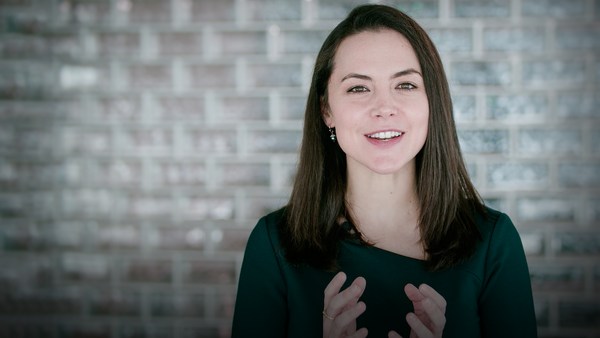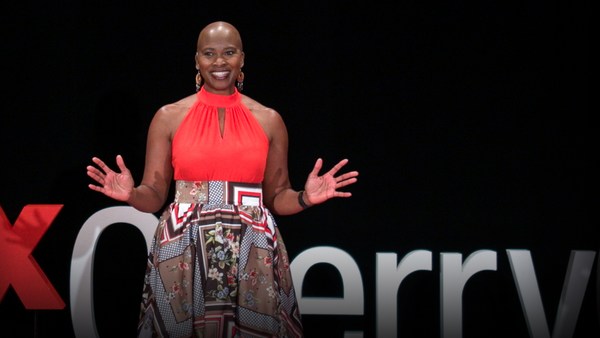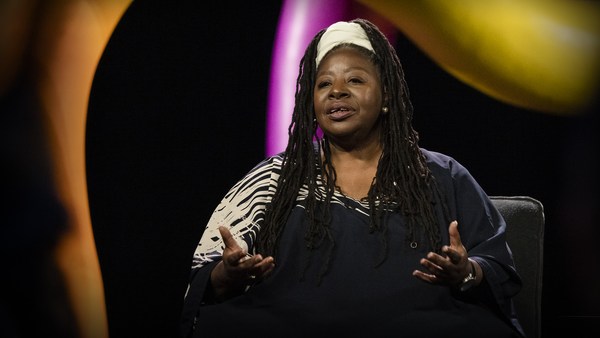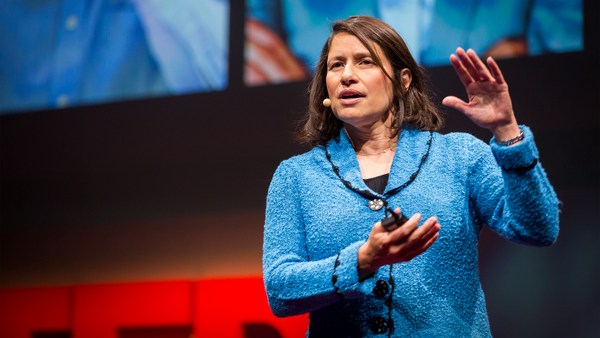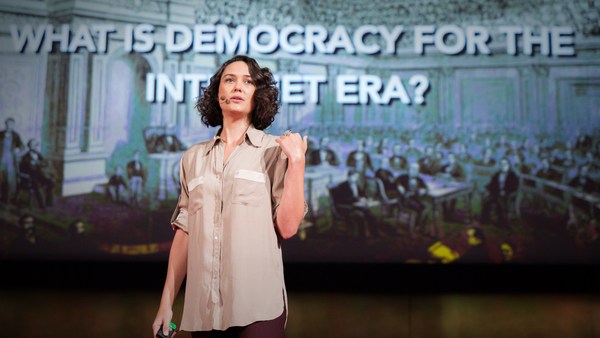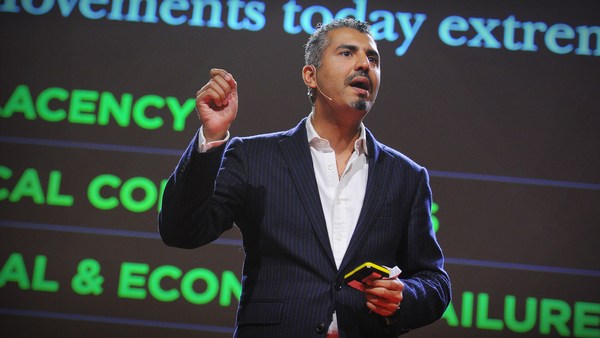OK, guys, let's go back to high school. Does anyone remember that feeling of walking into the school cafeteria with your tray in your hand and not knowing where to sit? Yeah, I see some people nodding, OK, cool. You might have sat alone, or perhaps more likely, you looked for someone who felt familiar. You sat with a group of people that reminded you of you. And even today, when deciding where to sit, how many of you chose to sit next to someone who looked or felt different from you? I would bet that not many of you did that. I guess not much changes in some situations, whether you're 17 or you're 70.
We've all likely felt this tendency to gravitate towards people who look, think and act like us. It's comfortable, but it can also be harmful because this polarization that we face today isn't just about believing that the other side is factually wrong. We are beginning to see the other side as malevolent beings with a hateful and hidden agenda. And you can see this. You can see this in the screaming cable news pundits, the politicians who vote down bills just because they come from the other side of the aisle. The hate groups that violently attack people who are different from themselves.
When I see these things as a teenager, I just feel so sad, so angry and so scared of this world that I'm soon going to be entering as an adult. But there's something that I found in having conversations with my peers that I think can be a path forward from all of this. An approach that focuses on conversations with the intent to listen and learn. Not to win and not to agree.
So I'm a 17-year-old from Naperville, Illinois. In the summer before my sophomore year of high school, I attended the ACLU National Advocacy Institute's high school program in Washington, DC. During this program, I had the chance to take part in a lot of different political discussions. And I remember this one conversation about the death penalty in particular. So back then, I wholeheartedly believed in this meaning of an eye for an eye. That punishment should be equal to the offense because, you know, that's what I grew up hearing. And so I argued the same. I was, however, met with immediate opposition. My peers told me that the death penalty is state sanctioned murder and that it reinforces the very behavior that it's trying to suppress. I tried arguing that the death penalty deters crime, but then my peers told me that in states without the death penalty, the murder rate is actually significantly lower. I then tried arguing that the death penalty brings closure for the victim's families, only to be told that the length between sentencing and execution actually puts the victim's families through an agonizing wait period. So by this point, I realized that this debate -- Not going all that great for me. I realized that my perspective was inherited, and this is when I decided to stop trying to win the debate, and instead I just listened.
And in the months that followed, I took it upon myself to learn more. I pored over articles and data from sources ranging from the more liberal, like the Brennan Center for Justice, to the more conservative, like The Heritage Foundation. And I learned that historically, capital punishment has been disproportionately applied to people of color. And that the death penalty isn’t actually proven to deter crime. Slowly, my thinking changed. And this change only happened because I engaged with people who had opposing perspectives. You know, it's hard to break out of your own echo chamber because most of the time we don't realize that we're even in one until we're out of it. But this was my first step.
So shortly after this experience, I started a nonpartisan initiative called Project TEAL to encourage and empower high school students to become politically involved. We discuss a lot of different issues like education equity, voter suppression, racial justice. And I've seen some amazing things happen when people just talk to one another. Understanding and accepting of our differences.
I actually remember this one conversation in the summer of 2020. There was a boy and a girl who were debating the merit of the Black Lives Matter movement. And I remember being afraid that their conversation would evolve into an argument. But it didn't. Instead, I learned that the girl, who is Black, came from a family that had been through a couple of rough instances with the police. And the boy, who was the son of a cop, came from an upbringing in which BLM was labeled as a movement in defiance of the police. Later on, I was surprised to learn that, though they still didn't agree, the boy and the girl learned something about the other that they didn't know before. And more than that, they appreciated how it shaped the other person's unique perspective. And this was only possible because they didn't delve into a shouting match or call each other disrespectful names. And for me, this was an “aha!” moment. I realized that we shouldn't back away from discussing polarizing issues, even if it's with people who disagree with us. Sure, it's uncomfortable, and yeah, I'd probably agree that we don't change our minds most of the time. But we can better understand opposing perspectives, which can help us to better advocate for our own beliefs. And maybe, just maybe, it even allows us to reach a compromise when the situation demands it.
So I think the question remains. How can we create space for this kind of bipartisan discourse? Well, I think the first step is finding a community. When I think back to my experience in the ACLU, I think the reason we were able to have that civil discourse was because we recognized that we were a part of a greater cause. And it's because my peers knew me, not just as an opposing voice, but as Shreya, their peer, their fellow teen activist and their friend. And when we are able to recognize what unites us, it becomes so much easier to have conversations about what divides us. And most Americans actually validate what I have seen in practice. While 77 percent of American voters polled before the 2020 presidential election said that they had just a few or no close friends who supported the other side's candidate, 79 percent of Americans agree that creating opportunities for bipartisan civil discourse would be effective in reducing divisions. Seventy-nine percent. That's pretty incredible, if you ask me.
We all have affinity groups that we can join. Maybe it's a friend group at your place of work, a book club at the local library or the PTA at your kid's school. Whatever this group is, try to have an uncomfortable conversation with them at least once a week. Now, OK, what exactly constitutes as uncomfortable? I would say that's really up for you to decide. It can be about politics, sure. Or it can be about a different topic entirely, like religion or identity. Whatever this topic may be, just talk about something that’s uncomfortable, unconventional and meaningful to you. And most importantly, do it with the intent to listen and learn, not to win and not to agree. And you know, another tip. Make sure to stay off of your phone for this conversation. Yeah. You know, as someone who's pretty much obsessed with TikTok, I completely understand how addicting social media can be. Believe me. But by discussing polarizing issues online, we lose that person-to-person connection that really humanizes opposing perspectives, that allows us to see and empathize with one another. Because by having these conversations, you will gain insight into people who think differently than you do. And who knows, maybe you'll convince someone of a belief that you hold dearly, or maybe you'll even be moved to reconsider your own viewpoint.
In a month's time, I'm going to be graduating from high school.
(Applause)
Over the past four years, I’ve learned a lot about creating positive discourse, but I’m still scared of this polarization, this growing unwillingness to view those who politically disagree with us as human. Honestly, it's a little overwhelming to think that I'm soon going to enter this reality where I'll be confronted with this division. Where I’ll be stereotyped and judged by my ideology, my identity and my way of thinking by people who don't even know the real me. As a teenager, it's a lot. And I know that many of my fellow Gen Zers feel the exact same way. And this is precisely why addressing this polarization crisis is so urgent and demands action from all of us.
Just for one moment, go back to that high school cafeteria, But this time you sit down with that other crowd. The kids who didn't look or think like you do. And just imagine what you could have learned.
Thank you.
(Applause)
